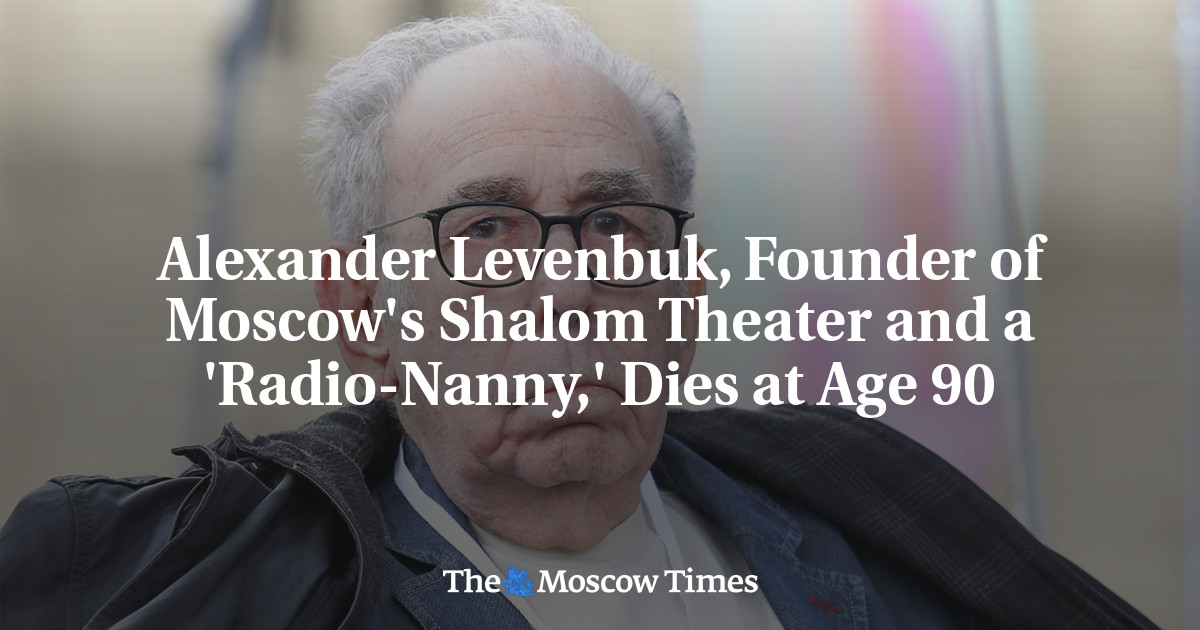
Alexander Levenbuk, the founding father of Moscow’s only Jewish theater, died at the age of 90 from natural causes on Dec. 22, TASS news agency reported, citing Alexander Brod, a member of the Presidential Council for the Development of Civil Society and Human Rights.
Levenbuk was one of the founders of Shalom, a popular Jewish theater.
Shalom was established in 1988 during the Gorbachev era, and Levenbuk was its director until 2021. The theater staged Jewish plays by noted authors such as Solomon Rabinovich, known under his pen name Sholom Aleichem.
Some critics compared Shalom with the Moscow State Jewish theater — often called by its acronym GOSET — that was founded by actor and director Solomon Mikhoels. Mikhoels was murdered by Stalin’s secret police in 1948.
Levenbuk, however, stressed the difference between his theater and GOSET: “Mikhoels staged plays in Yiddish, but he put on all kinds of plays including “King Lear.” We stage only Jewish plays, but in Russian,” he said in an early interview.
While his name doesn’t ring a bell for many young people of the TikTok generation, Levenbuk was an idol for millions of Soviet children and their parents during the Soviet era.
He was the man who taught Soviet children to speak their own tongue properly as a host of Radionyanya, or Radio-Nanny. Begun in 1972, it was a colorful and humorous show that explored the Russian language.
“The most important task for us at Radionyanya was to replace a grammar textbook for children. And we did it!” Levenbuk said.
Despite the political neutrality of the show, co-hosted by comedian Alexander Livshits and actor Nikolai Litvinov, it was not much liked by the state radio’s powerful boss Sergey Lapin, known for his anti-Semitic views.
But while Lapin was openly fighting with Jews on Soviet radio, he was not able to fire Levenbuk: the grandchildren of Communist Party Secretary General Leonid Brezhnev liked the show. “They saved us, since they adored Radio-Nanny,” Levenbuk said.
Levenbuk was also known as the person who helped Soviet pop diva Alla Pugacheva, now President Vladimir Putin’s bitter enemy for her anti-war views, to break onto the national scene. In 1967 Pugacheva was invited by Levenbuk to sing her first song on television.
Reminiscences about Pugacheva, as well as other stories were featured in Livenbuk’s 2021 book of humorous essays called “Breadcrumbs in My Pocket.”
“If you watch television you may see that many people feel nostalgia for socialism. I lived during that time, but I don’t feel any sort of nostalgia,” Levenbuk wrote in his book.
But in his mind he kept a very detailed portrait of an old city during that era: “I remember the pre-war Moscow I saw from our room in a communal apartment. It was a bad room in the basement and with a leaky ceiling that always dripped. It was not a nice place to live.”
Like many Jews at that time, Levenbuk didn’t attend synagogue given the Soviet suppression of religious activity. He said that he had his first chance to read the Torah only during the perestroika period. “It was at that time that I began to believe a bit,” he said.
In 2021 Levenbuk took the post of Shalom artistic director, and in that post was able to push the city government for the long-awaited renovation of the theater’s building.
Speaking about his life during an interview, Levenbuk recalled “King Lear” as staged by Mikhoels: “There is clearly something Biblical in the image of the wanderer Lear … In general, these themes of home, wandering, immeasurable and innocent suffering are, of course, ancient Jewish themes,” he said.
The funeral will be held Dec. 26 at House of Theatrical Workers in Moscow.





